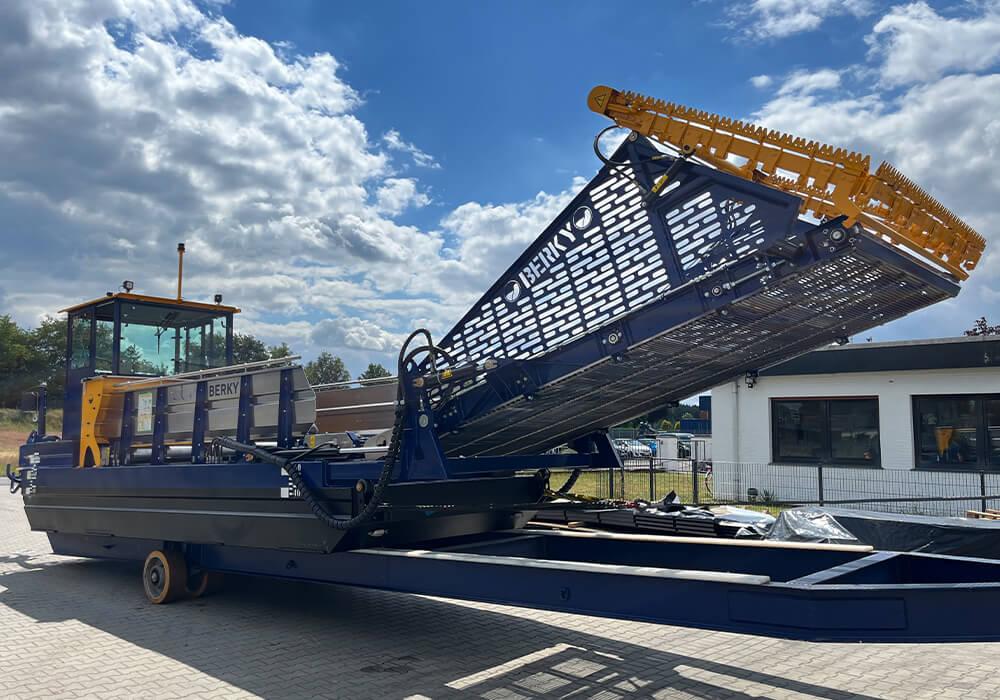
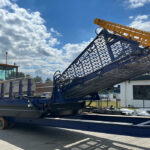
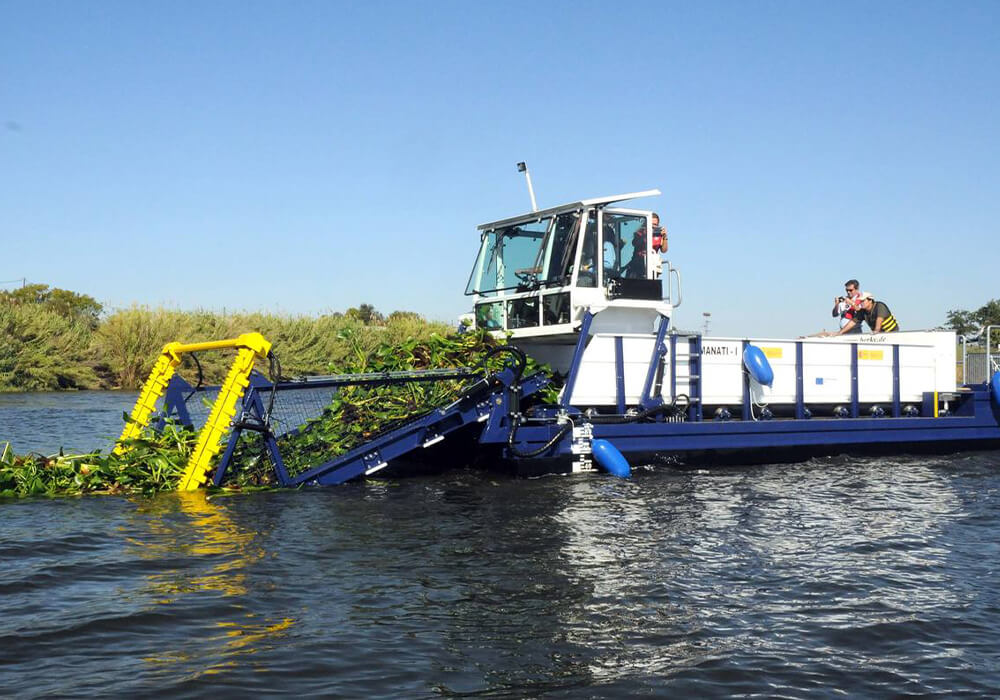
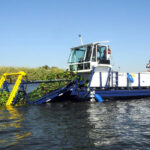
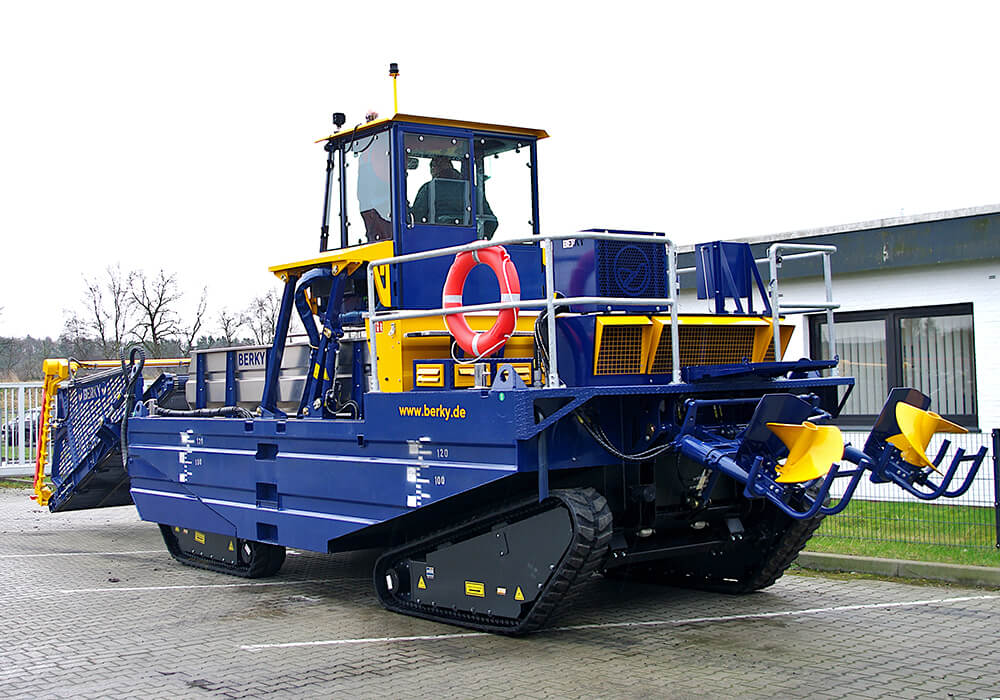
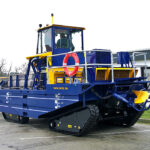
Fighting invasive waterplants and collecting trash in rivers and lakes with a weed harvester boat
Due to climate change, exotic waterplants, are spreading in regions they could usually not survive, regarding climate and habitat preferences. Especially plant species from tropical regions are more and more being found in colder, northern regions, can cause significant economical damages and manipulate the water ecosystem and environment in a negative way. BERKY offers reliable and proven solutions to keep the waters clear by providing special weed harvester boats.
Which plant species causes the biggest problems worldwide?
A wide spread plant species, that is particularly causing problems in Asian, African and American waters is often referred to as the ‚worst aquatic plant in the world‘ because of its extremely rapid spread and growth rate (up to 4.5 m a day) and its ability to form dense dominant matts on the water surface. The said plant is called Common Water Hyacinth, Eichhornia crassipes. Due to ist negative impact and specific color of the flower, it is also referred to as ‚Lilac Devil‘. Originally sold and cultivated as an ornamental plant due to the lavender-coloured flowers, it has spread rapidly over the years and now causes enormous problems for ships, fishing and tourism as well as for the production of drinking water.
The floating plant is not attached the ground via roots, but floats on the water surface with the help of air-filled outgrowths on the leaf stalks. Its root buds and stolons are spreading by wind, water movement or attached to ships or boats and can quickly form large populations along the river or lake. Its resistance to changes in water height, flow velocity, higher nutrient levels, pH values, temperatures and pollutants makes it a resilient and persistent plant. Only frost and low water temperatures affect its growth and can cause its population to shrink.
Disposing of the collected biomass that accumulates over time can be pricy. Therefore people in Asia and Africa tried using the plant as fodder or as material for producing baskets and furniture. Other possible uses, such as an energetic use of the plant or the production of plant charcoal fertilizer to improve the soil quality in agriculture, are already being developed and tested in various research projects.
What is the situation in Europe?
In Europe, other aquatic plant species are causing problems: Here we often find large populations of the Western Waterweed (Elodea nuttallii) and the Eurasian watermilfoil (Myriophyllum spicatum). Those plant species mainly spread vegetatively via stolons and broken stems that are transported over large distances by current movement or by birds, carrying pieces of the plant in their feathers. Next to water sports, these elongated plants also have negative affects on ship traffic, agriculture and drinking water facilities.
What can be done to remove dense masses of aquatic plants in rivers and lakes?
An efficient method to remove such aquatic plants is to collect them via weed harvester boats. The conveyor belt, which reaches into the waterbody is equipped with double blades for mowing said aquatic plants, allowing it to collect the plants to the loading area of the boat. After collecting, the plants can be easily transported on land by using the conveyor belt as a dumping shoot.
Next to mechanical removal, the usage of chemical pesticide, which are sprayed directly onto the plants, can function as an alternative control method. Furthermore, special carp or insect species are released to curb growth by feeding. However, these methods are only effective under special conditions. Chemical substances and pesticides can also have a negative affect on opulations of native plant and animal species.
Aquatic weed harvester as garbage collecting boat
Another use for these special BERKY boats is the collection and removal of garbage floating on the surface of the water. Due to careless disposal and discharge of waste, a lot of the world’s waters are heavily polluted. In Asian regions, for example, plastic waste from private households and from industry, often ends up in rivers, being transported into the oceans. By using weed harvester boats, large quantities of plastic can be conveniently removed from rivers or lakes.
NGO’s rely on BERKY solutions
Various NGOs (independent and mostly internationally operating non-profit organisations), such as the Aachen-based start-up “everwave”, are already using BERKY waste collection boats to remove garbage from rivers and reservoirs. If you are dealing with mentioned invasive aquatic plants or with waste in your waters, please contact us. We will be happy to provide the best solution to your problem and advise you in this regard.
Write to us
If you have any questions regarding the careful maintenance of watercourses or the flora and fauna at the watercourse, please feel free to contact our environmental scientist:
Find your perfect solution fast
Discover our selection of boats and use our configurator to find your ideal solution